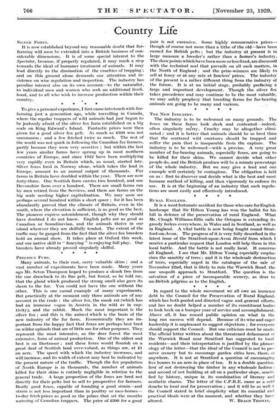In regard to the whole movement we all owe an
immense debt to the Council for the Preservation of Rural England, which has both pooled and directed vague and general efforts, and has no doubt helped a number of its constituent bodies to look back on a bumper year of service and accomplishment. Above all, it has roused public opinion on what in the long run success will depend. Because of its wise and eager leadership it is unpleasant to suggest objections ; for everyone should support the Council. But one criticism must be-made. The official letter written about the threatened defacement of the Warwick Road near Stratford has suggested to local residents—and their interpretation is justified by the phrase-
ology of the letter—that the ideal of the Council is not-to pre- serve scenery but to encourage garden cities here, there; or anywhere. It is not at Stratford a question of encouraging five houses to an acre in place of ten. It is a double question, first of not destroying the timber in any wholesale fashion ; and second of not building at all on a particular slope, sancti- fied by history, unique in its combination of literary and aesthetic charm. The letter of the C.P.R.E. came as a cold douche to local zeal for preservation ; and it will be as well if the Council stated in brief simplicity what its essential and practical ideals were at the moment, and whether they have






























































 Previous page
Previous page